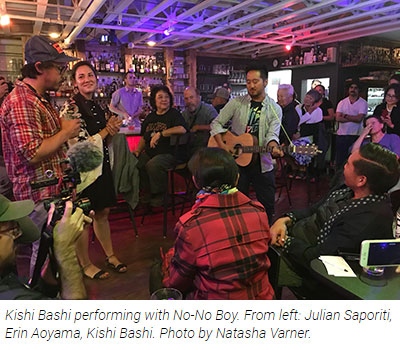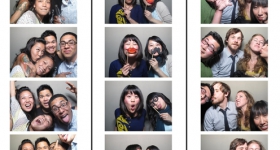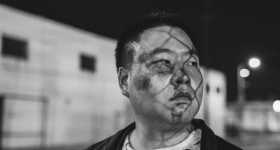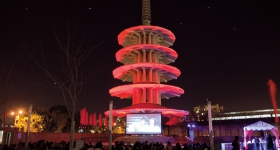We are in a remote part of Wyoming, watching the filming of Kishi Bashi’s new project, Omoiyari, outside the hospital barrack where my mother was born. Heart Mountain rises in the background, bathed in a shaft of “God light,” as the film’s director Justin Taylor Smith says. As his drone soars overhead, we see in aerial a lone figure in black playing violin, his hair upswept and his bow working against the wind. This is Kaoru Ishibashi, the indie musician who performs as Kishi Bashi, standing above what was once an incarceration center for 14,000 Japanese Americans during WWII.
A classically trained violinist turned singer-songwriter, Kishi Bashi is known for his luminous orchestral pop, showcased in songs like “Bright Whites.” His three studio albums, 151a, Lighght, and most recently, Sonderlust, range from playful songs like “The Ballad of Mr. Steak” to the intimate glimpses of heartbreak found on Sonderlust, an album that arose from briefly separating from his wife. Omoiyari takes his work in a new direction. The genre-bending “songfilm,” as Kishi Bashi describes it, may prove to be his most personal and political work yet. Combining documentary filmmaking, narrated storytelling and his symphonic compositions, Omoiyari tells of Kishi Bashi’s growing understanding of the history of Japanese American incarceration and the surprise of uncovering a Japanese American identity. This questing story arc becomes a vehicle for a much broader and deeper exploration of where historical wrongs meet current injustices and what actions must result from this knowledge.
At the time of our interview, Kishi Bashi and his team of filmmakers, musicians, ethnographers and scholars had come to the site of the former Heart Mountain Relocation Center to perform early work from Omoiyari and to finish filming. The audience was made up entirely of participants in the Heart Mountain Pilgrimage, an annual event that brings together former incarcerees, their relatives and interested community members for a weekend of performances and screenings, educational talks, multigenerational discussion groups and storytelling workshops. Kishi Bashi’s audience ranged from toddlers on their parents’ knees to people in their 80s and 90s who can recall their imprisonment at Heart Mountain during WWII.
I interviewed Kishi Bashi and members of his creative team to ask about how this project has taken shape in our current political moment. The interview took place in snatches at different points during the Pilgrimage, between filming or even in the background while the camera was running. We were joined by Director Justin Taylor Smith and musician-scholars Julian Saporiti and Erin Aoyama, doctoral students at Brown University who both have contributed to Omoiyari and who perform as the musical duo No-No Boy. The name of their group, “No-No Boy,” refers to an epithet that was sometimes hurled at Japanese American men during the war who answered “no” to both questions of the “Leave Clearance Application Form,” better known as the loyalty oath: “Are you willing to serve in the armed forces of the United States on combat duty wherever ordered?” and “Will you swear unqualified allegiance to the United States of America and faithfully defend the United States from any or all attack by foreign or domestic forces, and forswear any form of allegiance or obedience to the Japanese emperor, to any other foreign government, power or organization?” No-No Boy will be on tour this fall performing their multimedia concert, which is inspired by interviews with former Japanese American incarcerees and other personal accounts of Asian American experience.
Rebecca Rainof: Can you tell me a little about Omoiyari? What does the word “omoiyari” mean?
Kishi Bashi: “Omoiyari” is a Japanese word for empathy with action.
RR: In the film’s preview today you say “empathy without action is not enough.” Can you say more about this idea? A lot of people are feeling terrible and struggling with how to put their feelings into action. It strikes me that you're finding something to do right now through your art.
KB: Yeah, you can like that article about Syrian children, but then not do anything. Because, and I didn't realize this until I really started researching, the origin of theater is catharsis. So it's the idea that you empathize with seeing a movie and you feel better, without doing anything.
RR: What are your hopes for Omoiyari?
KB: My idea is to bring forward this film in a way that isn’t preachy. The arc is that people will follow my own personal journey starting as a naïve musician into becoming somebody who starts to understand American history the way it actually is. The whole idea is that the Japanese American incarceration story is a big piece of history that needs to be retold again in new ways. What I also discovered is that America has deep rooted problems that all of us don’t really want to acknowledge, even us Japanese Americans. It’s just the idea of acknowledging privilege and making sure everyone in the community is really taken care of.
RR: How did you first get the idea for this project, which you call a “songfilm”? Did it arise from working with your creative team, or did you come to it independently?
KB: No, the first incarnation is that I got commissioned by this orchestra in Miami called the Nu Deco Ensemble. They really supported me. I promised them a 25-minute multimedia piece [on Japanese-American incarceration]. I didn’t know what I was going to do, but they had enough confidence in me that they got a big grant. So what I did is I started filming. I wanted a visceral experience about the incarceration so I went to Manzanar. It was fortuitous I met Julian Saporiti and he told me about this trip through Brown University, and I just jumped on this trip with Julian and Erin Aoyama. We’ve been to Heart Mountain, Tule Lake, Rohwer, Jerome, Manzanar. Each place I go to I create my own music piece, and that will become my next album.
RR: You describe the arc of the film as following your personal journey. What new self-realizations resulted from making this project?
KB: Yeah, I had identity issues that I didn't realize. I thought I was white this whole time. Basically, my personality is white. I feel uncomfortable among Asian people, especially large groups of Asian people. Like this Pilgrimage is uncomfortable. I actually have a lot of Japanese friends, but I don't have a Japanese American community that I ever involve myself in. It's still a little uncomfortable to me. So, this is a big step for me. I'm starting to get involved in community more. I'm trying to get into it. These are the kinds of things that I uncovered about myself, like how my social circle is really just white people.
RR: In your presentation here at the Pilgrimage you identified your fans as being mostly white.
KB: Yes, privileged white people. Also Asian people who probably think they're white too. I live in Athens, GA, the deep south, and I didn’t really understand how segregated my community was. My movie is, in addition to being about the Japanese American incarceration, about racism and segregation and the whole pan-Pacific political dynamic that’s happening prior to WWII. We’re covering mass incarceration, making connections to contemporary relevance. Before this trip, we went to Selma, to Birmingham on our way to Arkansas. It makes me question my own privilege. I start to realize that I have a lot of advantages that a lot of people in our community do not. It is acknowledging this history, it’s acknowledging American history. I think it’s getting better, after we get over this little hump. The capacity of human beings is very inspiring.
RR: It sounds like you have an optimistic vision. Is that true?
 KB: I have optimism. Because the world’s not going to end. I don’t think the world ended. We’ve seen better and better. You have to keep refining your better. World War II was terrible for everybody back then. Everybody was pretty racist, you know? Even Japanese people were racist; that’s the other thing I’m covering, inter-minority racism. Finding commonality — that’s my big thing. As I am going to explain in my movie, one of the things that’s really not helping the current situation, the divide, is the media. After the election a lot of my fans were super depressed. I could see people were really distraught. What I see today is that the media propels this negativity. A lot of liberal people don’t even like the other side, don’t realize how the media just pushes and fuels this anger and negativity, and it doesn't help anyone. I wanted to help my people that I care for, like my family, people who listen to my music, to heal themselves. I wanted to help them feel good instead of just thinking the world was about to collapse.
KB: I have optimism. Because the world’s not going to end. I don’t think the world ended. We’ve seen better and better. You have to keep refining your better. World War II was terrible for everybody back then. Everybody was pretty racist, you know? Even Japanese people were racist; that’s the other thing I’m covering, inter-minority racism. Finding commonality — that’s my big thing. As I am going to explain in my movie, one of the things that’s really not helping the current situation, the divide, is the media. After the election a lot of my fans were super depressed. I could see people were really distraught. What I see today is that the media propels this negativity. A lot of liberal people don’t even like the other side, don’t realize how the media just pushes and fuels this anger and negativity, and it doesn't help anyone. I wanted to help my people that I care for, like my family, people who listen to my music, to heal themselves. I wanted to help them feel good instead of just thinking the world was about to collapse.
RR: Can you tell me a bit about how you all came together? How did you form as a team?
Justin Taylor Smith: I was working on a snowboard film, Endless Summer meets Michael Bay. We just cold-called Kishi Bashi to score the film. And that was the beginning of our relationship. We became buddies. He came to me with this idea to do Omoiyari, which at the time didn’t have a name at all. It wasn’t yet a concepted film project. I personally felt connected to the story only because I was fascinated driving by Manzanar as a kid, going to hike and climb and snowboard. We always passed Manzanar and I never understood what it was. I knew that there was Japanese American incarceration during WWII. I knew that was something that had happened. But in the back of my head what I thought is this was something we just had to do. It was a necessity to win the war. WWII for me, educationally, was always, “We were the saviors. We were the best. We saved the world from ultimate destruction. They were probably POWs.” Fast forward to October 2017, I met Julian and Erin. It was a moving experience. We spent four days touring the facility here [at Heart Mountain]. Erin’s story was very moving, seeing her go through the registry [of Japanese Americans who were incarcerated], seeing when her grandmother actually arrived. That was our first trip. I think we’ve done 10 trips. And now we’re at the Pilgrimage. It’s the first time I’m at a pilgrimage. Everyone acts as a family unit. We’re all learning and evolving and growing. I’ve never made a movie like this. Learning things at any age can have a profound impact on your character.
RR: Do you think that this project has changed you then?
JTS: Yes, 100 percent.
Julian Saporiti: I can speak to that. As an ethnographer, I’ve found it fascinating seeing Kaoru break down and rebuild as an Asian American, but also the filmmakers: what does it mean to be a white, straight man in the 21st century when you have to negotiate this historical past through the mediation of your friends of color?
RR: Julian and Erin, could you tell me about how you came to be part of Omoiyari and about No-No Boy?
JS: I was interested in talking to indie rock Asian Americans. I saw a poster that said Kishi Bashi and it had an Asian guy’s photo. And I thought, I should interview this guy. I say this with complete love: It was one of the most boring interviews I’ve ever done. He was just eating a salad, saving his voice and whispering his answers. Very diva. And I was like “Oh man, I can’t get anything out of this guy. I thought I was going to find a brother. Asian dude who plays indie rock. That was me.” And I asked, “What was your experience like. Are you experiencing all this identity conflict?” And he was like, “Oh no, I’ve never really thought about it.” Which is funny when you fast cut to today, when he’s up there talking about Omoiyari and the film he’s making. He asked me what I study. Then I told him how I study swing bands that formed in Japanese incarceration camps during WWII. And he said “Whoa, a symphony just commissioned me to write a piece about Japanese incarceration. And I have no idea what I’m going to do.” Ten minutes later he’s in my car texting his wife, “Hey, can I go on this trip with eight Brown Ph.D. students who are going to Japanese internment camps up the West Coast?” He comes on this trip with me, and that’s where I meet Erin. Omoiyari comes out of this trip he takes. And No-No Boy, as far as Erin and I being collaborators, comes out of this trip.
RR: Erin, can you tell me about your experience? Your grandmother was incarcerated at Heart Mountain? It sounds like you had a turning point in coming to Heart Mountain on your earlier trip with Kishi Bashi, to play a concert in the barracks.
Erin Aoyama: The barrack concert was special in particular because of how rooted it was in terms of place and history. To be singing songs about incarcerated Japanese Americans in one of the very same barracks that held entire families and lives — it was really powerful. Though it’s taken me until this summer, working at the museum at Heart Mountain, to realize this, I see how important my family story is to folks who hear our songs and stories. Even though I know very little about my family’s experience at Heart Mountain, just the fact that I represent an embodiment of Japanese American incarceration, I think, makes the stories that we tell more real, more tangible, for our audiences. Our barrack concert back in October, for a pretty much entirely white and Wyoming-based audience, was my first window into understanding just how much the work that we do with No-No Boy could bring folks together and, more importantly, create space for conversation and bridge-building across disparate life experiences and world views. If my time at the Pilgrimage left me with any salient thoughts (aside from really fun memories and straight up exhaustion), it’s that it is time to take action on the histories and memories surrounding Japanese American incarceration to address the injustices and inequities that exist today for other communities of folks — many the same or at least quite similar to what led to the treatment our ancestors endured before, during and after WWII.
RR: Kaoru, you’re here at the Pilgrimage with your daughter. Can I ask, do you talk to her about everything that’s going on in the news, for example family separation and immigrant detention, but also about the history behind Omoiyari?
KB: Yes, she's pretty woke. She followed me on this project, so she knows everything I'm working on. I just tell her to be compassionate. Be compassionate and fight for what you believe in.
This interview was edited and condensed from interviews and presentations over the course of the Pilgrimage.
Kishi Bashi’s team is currently finishing filming Omoiyari. No-No Boy will be touring this fall. Their concert schedule is available at https://nonoboymusic.tumblr.com/shows.










Comments